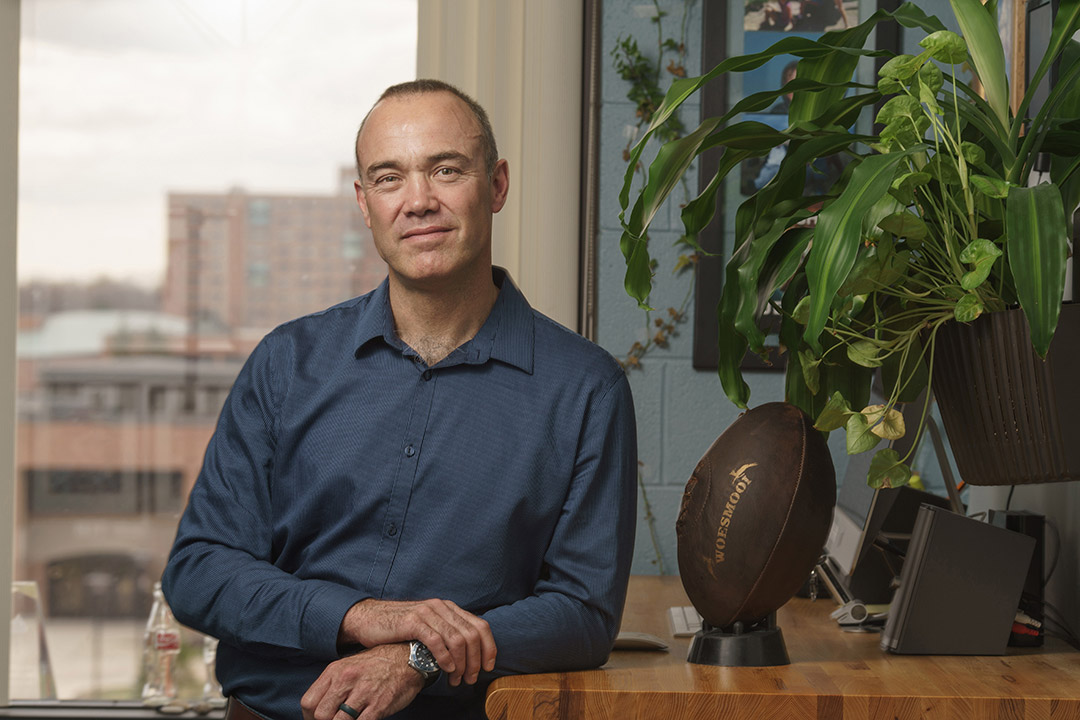Experiential learning is at the heart of Eisenhart Award winner Jan van Aardt’s teaching style
Scott Hamilton
Professor Jan van Aardt from the Chester F. Carlson Center for Imaging Science received the 2021-2022 Eisenhart Award for Outstanding Teaching.
Jan van Aardt is a strong believer in the power of experiential learning. When teaching classes about remote sensing and other topics, the Chester F. Carlson Center for Imaging Science professor uses collaborative projects and hands-on assignments to show his students the beauty of his field and help them build skills they can use for culminating experiences like their capstone projects.
“You learn by doing, not just by regurgitating,” said van Aardt. “I very firmly feel that most knowledge these days is a Google search away. If I ask you what a spectral response function is, you can tell me in maybe less than 15 seconds. But an underlying understanding is what is truly important and arguably should be the ultimate goal. I’d much rather have my students understand a principle and apply that principle in a way that eventually becomes second-nature to them.”
That approach has resonated with his students and helped van Aardt earn an Eisenhart Award for Outstanding Teaching, RIT’s highest honor for tenured faculty. While van Aardt is an accomplished researcher with more than 80 peer-reviewed publications who has secured millions of dollars in sponsored research, he said he was humbled to win the award because the teaching aspect of his job does not come to him naturally.
Faculty Awards
Meet Abdullah al Faruque, a recipient of the 2022 Eisenhart Award for Outstanding Teaching, and Jessica Hardin, recipient of the 2022 Provost’s Award for Excellence in Teaching.
“It’s something I continually evolve in, work at, and try to improve,” said van Aardt. “I find it very demanding emotionally and professionally, because you’re working with students from a variety of backgrounds, abilities, and visions for their future.”
Early in life, van Aardt said he never saw teaching in his future. After studying forestry and earning his undergraduate degree at the University of Stellensbosch in South Africa and MS and Ph.D. degrees at Virginia Tech, he moved on to work in industry as a scientist. But he felt that setting did not mesh with his personality and he was eventually drawn to academia, joining the RIT faculty in 2008.
He credits mentors like Ben Opperman, a physicist and early-career influence who exposed him to the physics-biology interaction of remote sensing; his mother, who was a teacher; and his middle and high school teachers for providing him teaching role models to aspire to.
He added that Professor Carl Salvaggio, director of the Digital Imaging and Remote Sensing Laboratory, remains a true role model. Salvaggio, in turn, said that van Aardt has two of the most important characteristics a teacher can have—he is passionate about students and always makes time for his students, no matter his other commitments.
“There is seldom a moment when one passes his office and you don't see one of his research assistants, or a student in one of his classes, engaged in an active discussion,” said Salvaggio. “Knowing that every opportunity that you have to talk with a student is an opportunity for both them and you to learn is what fosters that relationship of mutual respect between each of you, for the knowledge that each of you bring to the conversation. Dr. van Aardt always knows how to listen, understand, share, and to use his expertise to make every conversation an opportunity for his students, and for himself. Both he and his students are always learning.”
Class feedback from students has been critical to van Aardt’s growth and he has used it to better structure his classes over time. And as he has evolved his craft, he’s placed a bigger emphasis on teaching his students not just technical skills, but how to be well-rounded individuals.
“I find it’s a huge responsibility to educate students not only in terms of class content, but also in their professional skills, demeanor, and so on,” said van Aardt. “I’m proud of RIT and I want a future employer to look at our students and say ‘wow, RIT is doing something right.’ It’s really important to me that we can be proud of the students we send out to the workplace, and the best way to do that is to properly train them.”










